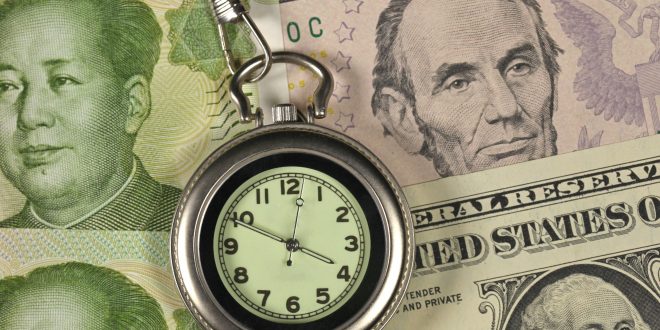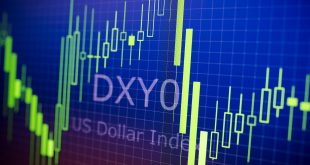Optimism regarding the development of a vaccine of Covid-19 continued to dominate the markets. Also, Democratic and Republican parties failed to reach an agreement on the second stimulus and financing package of Coronavirus.
The US currency suffered heavy losses during last week’s, to record a decline for the eighth consecutive week, as investors are looking to other currencies.
This is the longest series of weekly losses for the dollar in a decade, with the US economic data on Friday failing to support the US currency.
The United States has 5.01 million confirmed cases of coronavirus and more than 160,000 deaths, a record high.
The dollar index fell 0.3% to 93.0960, the eighth consecutive weeks of losses, the longest series of weekly losses since June 2010.
The dollar fell against the euro by 0.24%, the single European currency rose to $ 1.1842, while the dollar rose against the Japanese yen by 0.04% to the level of 106.6400 yen, and it fell by more than 0.10% against the pound to $ 1.3101, on Friday.
The dollar index, which measures the performance of the greenback against a basket of 6 major currencies, retreated to 94.4350, retreating by 1.57%.
The dollar did not move after data showed a 1.2% rise in the headline figure of US retail sales in July.
Stocks
US Wall Street indices ended the week’s trading higher for the third week in a row, as the Dow Jones rose 0.1% at 27,931.02 points, recording a weekly gain of 1.8%, while the S&P settled at 3372.8 points, but it recorded Weekly gains of 0.6%, while the “Nasdaq” index fell by 0.2% to 11,019.3 points, but it made a slight increase by the end of the week by 0.08%.
As for the performance of the European market at the end of the week, STOXX 600 declined by 1.2% to 368.02 points, while it increased by 1.2% by the end of the week, while the FTSE 100 index fell 1.5% to 6,090.04 points, up by 1% by the end of the week. The German DAX index fell by 0.7% to 12,901.3 points, but it made weekly gains of 1.8%.
The Nikkei index posted a rise of more than 4% over the week, closing its last session at 23289.36 points, with gains of 959 points, and the TOPIX recorded gains of about 77 points during the past week, a rise of about 5%, ending The week at 1623.38.
Gold
Gold prices witnessed great losses during the past week, as the metal lost more than $ 20 with the rise in US bond yields, the yellow metal failed to take advantage of the dollar’s losses over the past week, to record the first weekly decline since early June.
The yellow metal was also unable to benefit from the US retail sales index data, which showed an increase of 1.2% in July, without expectations of a 2% rise compared to a rise of 8.4% in June.
Oil prices declined during last Friday’s trading but recorded gains for the second week in a row amid growing confidence that demand for fuel has begun to recover despite the Coronavirus pandemic that has struck economies around the world.
Oil
Brent crude futures for October delivery are currently trading at $ 45.04 a barrel, up by 0.45%, while NYMEX crude futures for September delivery rose 0.64% to $ 42.28 per barrel.
Data from the US Energy Information Administration showed that natural gas stocks rose by 58 billion cubic feet in the week ending on August 7, to reach the level of 3332 billion cubic feet.
US oil inventories decreased by 4.5 million barrels during the week ending August 7, to record 514.1 million barrels.
Data
Data released by the University of Michigan revealed that the consumer confidence index in the United States rose to 72.8 points in the preliminary reading this August, compared with 72.5 points recorded in July.
he consumer price index in the United States increased during the twelve months ending in July by about 1% compared to a rise of 0.6% during June.
As for the core inflation rate, which excludes food and energy costs, it increased by 1.6% in the 12 months ending last July.
Data issued by the Federal Reserve Bank revealed that industrial production in the United States increased by 3% last July, compared with an increase of 5.7% in the previous month.
Retail sales rose by 1.2% last July, with a seasonally adjusted reading, compared to an increase of 8.4% in the previous month.
On the other hand, the number of new jobless claims in the United States reached 963,000 in the week ending August 8, down 228,000 from the previous week after the upward revision.
The US budget deficit declined to $ 62.99 billion last July, compared to a deficit of $ 119.6 billion on an annual basis.
 Noor Trends News, Technical Analysis, Educational Tools and Recommendations
Noor Trends News, Technical Analysis, Educational Tools and Recommendations





